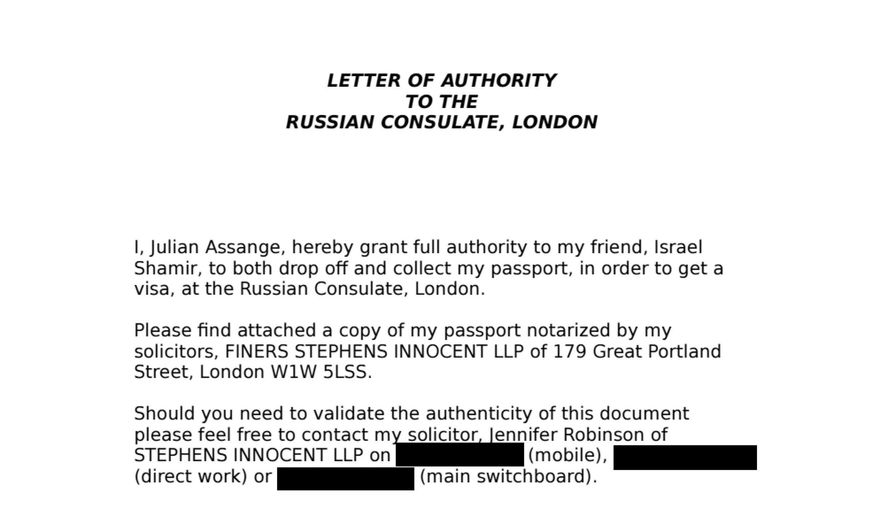WikiLeaks has denied publisher Julian Assange sought a visa from Russia, disputing a recently leaked letter written to Moscow’s consulate in London shortly after the website first started releasing classified U.S. diplomatic documents.
The anti-secrecy organization pushed back on social media Monday after The Associated Press released a “letter of authority to the Russian consulate” from Mr. Assange dated Nov. 30, 2010, two days after WikiLeaks began releasing hundreds of thousands of sensitive U.S. Department of State cables.
“I, Julian Assange, hereby grant full authority to my friend, Israel Shamir, to both drop off and collect my passport, in order to get a visa,” said the letter.
WikiLeaks declined to comment for the AP’s reporting on the letter, instead taking to Twitter to dispute its authenticity in dozens of tweets.
“Mr. Assange did not apply for such a visa at any time or author the document,” WikiLeaks said in a statement posted at least 35 times by its official Twitter account following publication of the AP’s report.
The source of the letter is Sigurdur Thordarson, WikiLeaks said in the statement. An Icelandic former WikiLeaks volunteer-turned-FBI informant, Thordarson was convicted in Sept. 2015 of sexually assaulting several minors and sentenced to three years in prison.
“The AP’s source is a convicted document forger, pedophile and paid FBI informant,” WikiLeaks tweeted. “Thordarson distributed these docs to Scandinavian media outlets years ago who found them to be untrustworthy. Thorsdarson, a proven serial document fabricator & media hoaxer has been released, so the docs are being recycled yet again.”
An email sent to Thordarson, 25, was not immediately answered.
The Russian Embassy in London declined to discuss personal details, AP reported.
Ultimately traced to Chelsea Manning, a former Army intelligence analyst, the State Department cables released by WikiLeaks in late 2010 exposed intimate diplomatic discussions involving the U.S. and its allies. That further embarrassed the Obama administration on the heels of the website recently leaking sensitive military material provided by the same source detailing the wars in Afghanistan and Iraq.
Mr. Assange, a 47-year-old Australian native, was arrested shortly after the release of the State Department cables in connection with rape investigation launched by Swedish prosecutors. He subsequently was granted bail and sought refuge inside the Ecuadorean Embassy in London, where he has resided since 2012.
More recently, WikiLeaks in 2016 released Democratic Party documents during to the U.S. presidential race that were sourced by Russian state-sponsored hackers, according to U.S. intelligence officials. Moscow has denied involvement in the leaks, and Mr. Assange has insisted his source was a non-state actor.
Along with material including Mr. Assange’s passport, the 2010 letter to the Russian consulate was obtained along with a cache of internal WikiLeaks documents provided by the AP prior to publication of Monday’s article.
• Andrew Blake can be reached at ablake@washingtontimes.com.




Please read our comment policy before commenting.